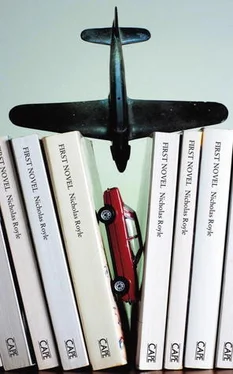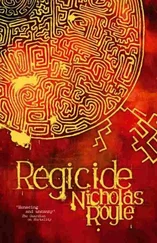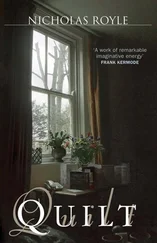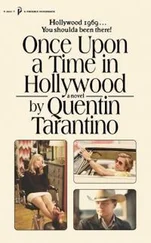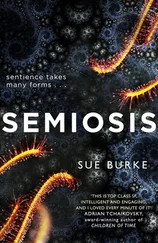Ray flew into RAF Northolt and caught the Tube to London and then a train to Manchester. He took a bus from Piccadilly Gardens to Hyde and felt mildly alienated — although he wouldn’t have used that actual word to describe the feeling — to find himself walking down the streets of his childhood after three years spent living thirty miles off the coast of East Africa.
‘It’s our Raymond,’ his father said when he opened the door to him, offering a slightly awkward handshake.
Ray’s mother appeared and hugged him, not without warmth, then led him into the morning room, which had been transformed. It had been repapered and a new carpet had been put down. A playpen formed a square enclosure on the floor and in it sat a three-year-old boy playing with a wooden train set.
‘Is this…?’ Ray asked.
‘This is Nicholas,’ Ray’s mother confirmed.
‘Hello Nicholas,’ said Ray, bending down beside the playpen.
‘Nicholas,’ Ray’s mother said, folding her arms under her bosom, ‘this is… this is your father.’
Nicholas looked up briefly, turning startlingly big blue eyes on the newcomer, then returned to his train set.
‘Nicholas…’ said Ray’s mother.
‘It’s all right, Mam,’ said Ray. ‘He’s not set eyes on me for three years.’
‘And he may not for another three either,’ grunted Ray’s father from the doorway.
‘Me dad’s right, Mam. Looks to me like you’re doing right by the little feller.’
‘Aye, well,’ said Ray’s mother, moving some knitting off a chair so she could sit down.
‘You’ll not be stopping long,’ Ray’s father said.
It wasn’t clear to anybody, possibly even to Ray’s father himself, whether this was a statement or a question.
‘I’ve got to go to Newcastle,’ Ray said.
Nobody asked why.
He took a train from Victoria. Three hours later he stepped on to the platform in Newcastle. He caught a bus to Whitley Bay. North of the white dome of Spanish City, the seafront was windswept and bleak. He walked a little way on the links, then turned inland under the shadow of a tall block of flats. He checked the name of the building — Beacon House. He was going the right way. Leaving Beacon House to his left, he entered a new estate comprised of two or three long, looping roads and numerous dead ends. Modern, boxy, flat-roofed houses constructed out of brick, tile and wooden boards. When he reached Granada Place, he turned in. It was a short cul-de-sac, houses on either side, a white wooden fence at the end. On the right, a man with a bald head and tufts of curly grey hair above his ears was cleaning a red Beetle. The door to his house was standing open and from within could be heard the sound of scales being played on a piano. The man smiled at Ray, who smiled back once he had spotted the number on the house, an even number.
Number 7 was at the end on the left. A grey Morris Minor stood on the short concrete drive in front of a yellow garage door. Ray took a deep breath, held it and let it out. He looked towards the white wooden fence that marked the edge of the property. Beyond it lay a green space bounded at the far side by a wooded gulley.
Ray stepped up to the front door and rang the bell. A two-note tone could be heard from inside the house. Ray took a step back and swallowed. He heard footsteps within and then the door was opened by a thin woman of about forty in a simple nylon dress with a pattern of blue and green pebble-like shapes. Her face looked tense under carefully applied make-up, large grey-green eyes wary beneath blue-shadowed lids.
‘Raymond Cross,’ he announced.
‘Hello, Mr Cross. June Flynn. Please come in.’
June Flynn led Ray into an open-plan lounge/dining room that ran from the front of the house to the back. A wide wooden cabinet stood in the middle, two pot plants trailing upwards into a trellis-like structure that formed a subtle division between two distinct areas.
‘Please have a seat, Mr Cross,’ said June Flynn.
‘Thank you, Mrs Flynn. Please call me Ray.’
June Flynn offered a weak smile. ‘Then you must call me June. My husband will be down in a moment. You have had a long journey. Would you like some tea?’
‘Tea would be lovely. Thank you.’
June Flynn left the room. Ray could hear her heels crossing the tiled floor in the hall and entering the kitchen. He heard the opening of cupboards and a fridge, the boiling of a kettle. Otherwise the house was silent. Eventually, June Flynn returned carrying a tray. She put it down on the coffee table in the centre of the lounge area. There was a pot of tea, a small jug of milk and three cups and saucers.
The tea was poured. Ray noticed that June Flynn placed her husband’s cup on its saucer, but poured neither milk nor tea into it.
‘Would you like sugar, Ray?’
‘No, thank you, June.’
She passed him his tea and he thanked her again.
‘You have a lovely house,’ he said, ‘in a very nice setting.’
‘Thank you. Yes, Briar Dene is lovely.’ She indicated the common land next to the house. ‘Russell used to play there when he was little.’
Immediately her eyes glittered and she turned away.
‘Excuse me,’ she said, getting to her feet and going to the wooden cabinet for a box of tissues. ‘I’m so sorry, Mr Cross.’
‘Please, June,’ Ray said, moving forward to the edge of his seat. ‘I’m sorry. I didn’t want to upset you by coming.’
‘I’m very glad you’ve come. Very glad.’ June Flynn dabbed at her eyes, trying not to smudge her make-up. ‘The RAF sent someone, of course, but that was because they had to. It was official.’
‘Yes.’
There was silence for a few moments and then they both started speaking at the same time.
‘I’m sorry,’ said Ray. ‘After you.’
‘I was just going to ask how well you knew Russell.’
‘Well, as you know,’ Ray began, clearing his throat, ‘Russell had not been in Zanzibar very long before he…’ Ray paused, spotting the trap he had unwittingly set for himself.
‘Before the accident.’
‘Yes, before the accident. Mrs Flynn. June. I wanted to come and see you and your husband to express my condolences in person and to say that Russell was a fine young man, an excellent addition to the squadron and a real credit to you.’
June Flynn suddenly spasmed and coughed explosively as she leant forward. The cough turned into a brief but horrifying moan and a flurry of tears fell on to the coffee table. Ray leant across and gently pushed the box of tissues in her direction. After a moment, she recovered her composure.
‘I’m sorry. I didn’t want to do this,’ she said.
‘Please,’ said Ray. ‘There’s absolutely no need to apologise.’
‘Will you excuse me for a moment?’
Ray got to his feet as June Flynn left the room for a second time. He crossed to the mantelpiece over the gas fire, where there were two framed photographs. One showed Russell and his parents when the boy could only have been about thirteen or fourteen. June Flynn looked happy and relaxed, not as gaunt and serious as the woman who now lived in the same house. Her husband stood slightly behind her wearing a pink button-down shirt, a thin black tie and a narrow-lapelled tweed jacket. He wore glasses that reflected the sunlight so that Ray could not see his eyes.
The other photograph showed Russell Flynn wearing his uniform with obvious pride, his blond hair combed back from a wide, clear forehead. Ray returned the photograph to its original position as he heard June Flynn coming back into the lounge. He stepped away from the fireplace and turned to face the room, assuming that she had perhaps gone to get her husband, but she had returned alone.
‘My husband and I would like you to have this,’ she said, holding an unidentified object out towards him.
Читать дальше
